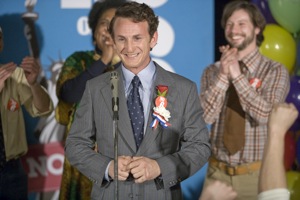-
- Transgender prostitute slain in Memphis shadows
- Iowa Supreme court to hear same-sex marriage arguments
- Poll: Calif. same-sex marriage ban driven by religion
- Star-studded video protests anti-same-sex marriage vote
- Fired University of Toledo administrator sues school
- Too early to know if Mo. school had HIV outbreak
- National News Briefs
- World News Briefs
Arts & Entertainment
Milk: Never blend in
Gay icon’s life yields lessons after 30 years
Published Thursday, 11-Dec-2008 in issue 1094
SAN FRANCISCO (AP) – Last month, when it looked like same-sex marriage was on the rocks in California, gay rights activists summed up their angst about the upcoming Proposition 8 vote with four wistful words: What would Harvey do?
Harvey was Harvey Milk , the late San Francisco supervisor and subject of Milk, the film that opened Nov. 26 about the pioneering gay politician assassinated along with Mayor George Moscone 30 years ago on Nov. 28.
There are parallels between the gay rights battle of Milk’s time and today. Defeating a ballot measure – a ban on openly gay teachers in public schools – was the apex of Milk’s short career. And now, with passage of California’s ban on same-sex marriage, activists re-examining Milk’s legacy are questioning whether an outsized political leader could have made the difference this time.
“Harvey Milk came from a politics of real discomfort. There was a righteous rage that was motivating him and the people he was working with,” said Rafael Mandelman, president of a local gay Democratic club renamed for Milk. “Maybe the community got too comfortable.”
Even in Milk’s day, California was the center of a national fight pitting gays and lesbians seeking expanded rights against conservatives espousing traditional values. In both cases, proponents of the ballot measures warned that schoolchildren would be taught a gay “agenda” if the initiatives failed.
The gay and lesbian community corralled support from high-profile Democrats – President Jimmy Carter three decades ago and presidential candidate Barack Obama this year – and Republicans alike. In persuading Gov. Arnold Schwarzenegger to come out against Proposition 8, gay leaders reminded him that another actor-turned-politician, Ronald Reagan, opposed the gay teacher ban in 1978.
Milk’s contemporaries say the campaign against the marriage ban lacked a fiery figurehead to challenge gays to demand equality. When he was not debating state Sen. John Briggs, the Orange County lawmaker who sponsored the gay teacher ban, Milk rallied potential volunteers with a cry: “Come out, come out wherever you are!”
The Election Night triumph Milk celebrated 20 days before his death “shows you that an ideal – well-organized and well-articulated – can go a long, long way,” said Tory Hartmann, a Democratic activist in the 1970s. “It just takes one person.”
In contrast, some activists have criticized the No on 8 campaign for being too reactive, failing to mobilize ethnic and churchgoing Democratic voters, and keeping same-sex couples out of advertisements.
David Mixner, who co-managed the campaign against the teachers ban, said same-sex couples might still have the right to wed in California if today’s leaders had been less polite.
“It wasn’t that Harvey was universally loved back then,” Mixner said. “He was a hard-core player and at times he was difficult to love, but ... damn, did I respect him.”
A new generation of activists is using the film’s release as a rallying point. The organizers of the nationwide protests against Proposition 8’s passage held this month are calling on same-sex marriage supporters to fill movie theaters in the coming weeks to show their financial clout.
Along with Milk, the story of the boyish gay martyr who is regarded as the Martin Luther King Jr. of the gay civil rights struggle has inspired documentaries, a Broadway play and namesakes as varied as a New York City high school for gay teenagers and a grove of trees in Israel.
Days before the Nov. 27, 1978, assassinations, county Supervisor Dan White had resigned from the board. He blamed Milk and Moscone when the mayor refused to reappoint him. White, a former police officer, sneaked through a window at City Hall to avoid a metal detector and shot both men.
After a jury convicted White of manslaughter instead of murder, thousands rioted in protest. White served about three years in prison, was released, then committed suicide.
To this day, it remains a matter of dispute whether White targeted Milk because he was gay.
“This had nothing to do with sexual orientation. It had to do with getting back his position,” said U.S. Sen. Dianne Feinstein, who was president of the San Francisco Board of Supervisors in 1978 and replaced Moscone as mayor. “Dan White was a troubled man under a lot of pressure.”
Feinstein found Milk’s body.
The memories are so raw that she is skipping the chance to see herself portrayed in the movie. Feinstein also declined to attend the dedication Tuesday of a job training center on an old Treasure Island military base renamed in Milk’s honor.
House Speaker Nancy Pelosi, former Mayor Willie Brown, U.S. Rep. Barbara Lee and others unveiled a bronze sculpture of Milk outside the building, which is believed to be the first federal structure named for an openly gay person.
After an Army honor guard raised the American flag, Milk’s nephew, Stuart Milk, said the work that his uncle started was far from finished, noting that openly gay people still cannot serve in the military.
“We have rights,” he said. “We just don’t have equal rights.”
|
|
Copyright © 2003-2025 Uptown Publications


